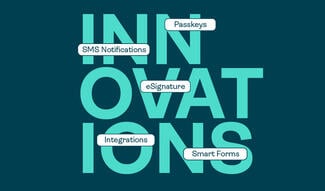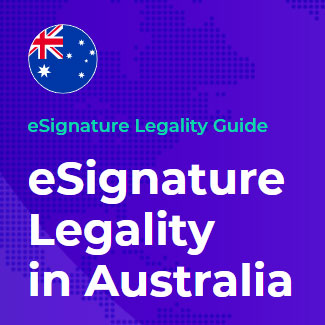Are Electronic Signatures Legal in Australia?

Yes. Here’s what makes electronic signing legal, admissible, and enforceable.
For the past 20 years, e-signatures have been gaining traction in Australia. From a legal perspective, Australia was an early adopter of electronic signature. In 1999, the Australian Parliament passed the Electronic Transactions Act. The Electronic Transactions Act 1999 gives electronic signatures the same legal status as handwritten or wet-ink signatures.
Today, e-signature adoption by Australian businesses and consumers has grown exponentially as COVID-19 brought new urgency for the technology to help keep businesses afloat. And while Millennials are driving growth in digital document use and e-signatures, increases in electronic signature adoption have been seen across all generations as many people e-signed for the first time in 2020.
Yet despite the fact that many in Australia have used some form of electronic signature technology for their digital transactions, there is still confusion about the legality of e-signatures. That’s why we’re going to take a better look at their legality in Australia.
Validity of Electronic Signatures in Australia
While every country has different laws, regulations, and rules regarding electronic signatures, this form of signature is enforceable, admissible, and more importantly, legal in the Commonwealth of Australia. However, there are still some misconceptions regarding electronic signatures, and some people aren’t aware that they are valid in demonstrating one’s intent to be bound to an enforceable agreement or contract.
Specific Australian laws exist that govern e-signatures. This includes the Electronic Transactions Act 2000 (Cth) (ETA), which applies to transactions governed by Commonwealth laws. There is also the Electronic Transactions Regulations 2000, which indicates which transactions and Commonwealth laws are exempt from all or part of the ETA.
Execution of the governing laws depends on the Australian states and territories. However, certain categories are generally exempt. Exemptions include the execution of deeds, wills, powers of attorney, and legal proceedings.
Other Related Regulations & Legal Requirements
The COVID-19 pandemic has prompted changes to legislative and regulatory activities in order to ensure the safety and protection of businesses and consumers. For example, in May 2020, the Australian government permitted corporate contracts to be executed using e-signatures and electronic documents through the Corporations (Coronavirus Economic Response) Determination (No.3) 2020 (Cth) (COVID Determination).
The country also made efforts to amend the 2001 Corporations Act and other relevant regulations and legislation to allow for the use of electronic signatures when executing legal documents and electronic contracts, and to enable witnessing of official documents via videoconferencing or other secure technological means.
Temporary laws have also been enacted in response to COVID-19 which alter the legal position of electronic signatures for specific documents and electronic communications. For example, Queensland has enacted the Justice Legislation (COVID-19 Emergency Response—Documents and Oaths) Regulation 2020 (Qld), which permits the electronic witnessing and signing of deeds.
Key Considerations When Using E-Signature Technology
Many different software tools enable Australian companies to stay compliant with the most up-to-date digital signature regulations and requirements. Through e-signature technology, businesses of all sizes are able to provide a positive digital experience for customers engaging in online activities. For example, Loan Market, a key player in the Australian real estate and mortgage lending ecosystem, has fully digitised its offering by integrating electronic signature with its MyCRM platform. Headquartered in Sydney, NSW, Loan Market's clients now have a completely paperless journey, which saves time for both the client and broker. Prior to e-signature, it was challenging to get documents signed with a wet ink signature, especially for people who lived far away from their broker.
If you’re considering e-signature technology for your business, here are some things to keep in mind when choosing a digital signature provider:
- Identity assurance – The vendor should offer a number of identity verification and authentication methods to verify the signatory's identity – whether they are known or unknown to the business.
- Document security and tamper-proofing – The e-signed document needs to be secured by adding a digital signature to the document. Look for a vendor that offers one-click signature and document verification to confirm the integrity of the e-signed document.
- Audit trails – Look for the ability to view a single audit trail of the entire agreement process that captures all the e-signature actions (i.e., what they signed, when, and where), as well as the identity verification and authentication events.
- Data residency – Ensure that the vendor has the ability to protect your data and comply with local data residency and data protection laws.
OneSpan Sign e-signature solutions are designed to ensure your business meets the digital signature laws and regulations in Australia. Our solutions are designed to be compliant with the major e-signature regulations around the world, including, including eIDAS, the Uniform Electronic Transactions Act (UETA), and the Electronic Signatures in Global and National Commerce Act (ESIGN). You’ll be able to finalize business transactions digitally, while maintaining a great customer experience.
Conclusion
In partnership with legal experts, we’ve developed an online e-signature legality guide specifically for businesses who have adopted, or are looking to adopt, digital signature technology. In this guide, you’ll gain clarity on some of the most significant electronic signature laws and regulations, and also learn some of the common misconceptions about the legality and enforceability of e-signatures.
Disclaimer: The information contained on this page is for information purposes only, provided as is as of the date of publication, and should not be relied upon as legal advice or to determine how the law applies to your business or organization. It is recommended that you seek guidance from your legal counsel with regard to law applying specifically to your business or organization and how to ensure compliance. OneSpan does not accept liability for the contents of these materials or for third parties.










